Crucial v4 (256GB) Review
by Kristian Vättö on November 22, 2012 1:01 PM ESTRandom Read/Write Speed
The four corners of SSD performance are as follows: random read, random write, sequential read and sequential write speed. Random accesses are generally small in size, while sequential accesses tend to be larger and thus we have the four Iometer tests we use in all of our reviews.
Our first test writes 4KB in a completely random pattern over an 8GB space of the drive to simulate the sort of random access that you'd see on an OS drive (even this is more stressful than a normal desktop user would see). I perform three concurrent IOs and run the test for 3 minutes. The results reported are in average MB/s over the entire time. We use both standard pseudo randomly generated data for each write as well as fully random data to show you both the maximum and minimum performance offered by SandForce based drives in these tests. The average performance of SF drives will likely be somewhere in between the two values for each drive you see in the graphs. For an understanding of why this matters, read our original SandForce article.
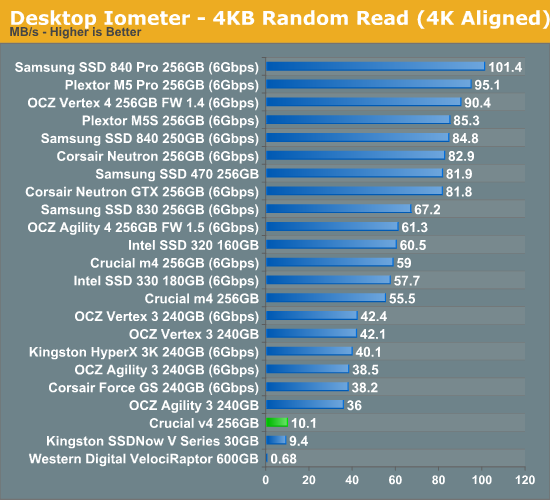
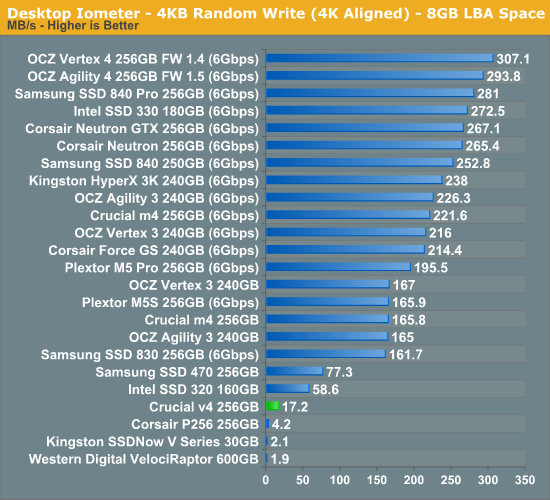
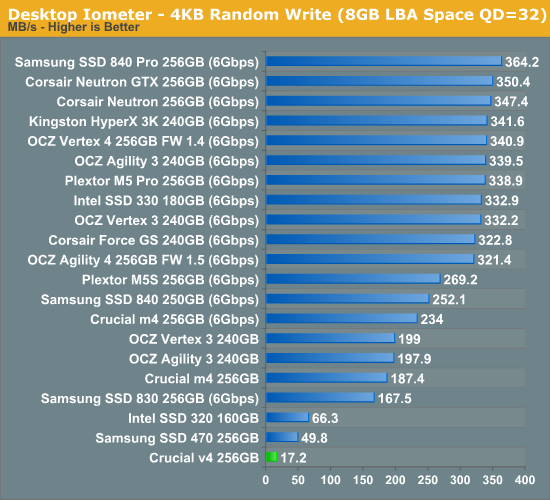
There isn't really a good way to put this: random performance is terrible. We have to go back at least two years to find SSDs this slow and even then we are talking about SSDs that were some of the worst ones that were available. I included a few older SSDs (e.g. Kingston SSDNow V Series and Corsair P256) to show that the v4 isn't the worst SSD on earth, but compared to other recent SSDs it's behind - by a lot. The only "good" news is just how poor even the 600GB VelociRaptor is by comparison; we're still an order of magnitude faster than one of the fastest hard drives for random IO.
Sequential Read/Write Speed
To measure sequential performance I ran a 1 minute long 128KB sequential test over the entire span of the drive at a queue depth of 1. The results reported are in average MB/s over the entire test length.
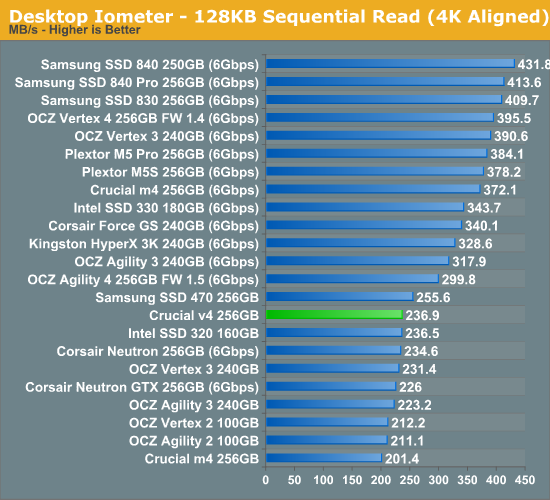
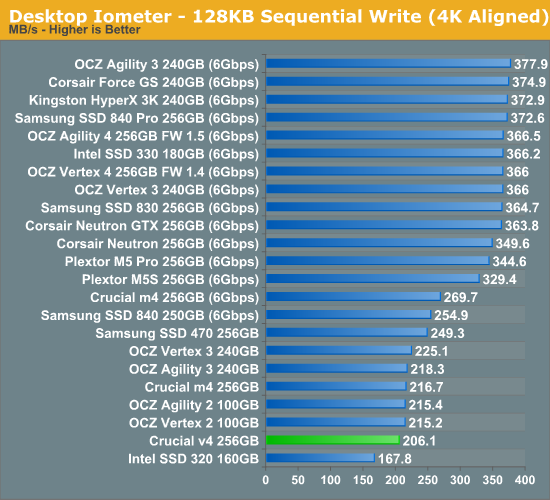
Sequential speeds are fortunately much better and we are talking about performance comparable to SATA 6Gbps operating at SATA 3Gbps speeds.










44 Comments
View All Comments
beginner99 - Thursday, November 22, 2012 - link
or 1 TB version for cheap would be available this would make sense in a laptop. But at these small capacities and the performance, it is just not recommendable. I mean my intel G2 beats it in every aspect except write.Death666Angel - Thursday, November 22, 2012 - link
Yeah, pretty much my opinion, too. I've been looking to upgrade to a new SSD for a while. The Crucial v4 is sometimes cheaper, but not by much (10-20 € compared to decent SATA 6Gb/s drives), so that it isn't really worth it to me, even if all I have at the moment are SATA 3Gb/s controllers. :)Wolfpup - Thursday, December 13, 2012 - link
Glad I saw this review, I was expecting it to be so different from the M4. Personally I'd just go for an M4. Intel's 320 series is IMO one of the best drives on the market too, but it's just too expensive versus the M4. 520 is Sandforce...kinda bug fixed Sandforce but still....WooDaddy - Thursday, November 22, 2012 - link
I'm somewhat speechless at how horrible the performance of this SSD is for a NEW product.Kristian, IF you have the time, could you add the Velociraptor to the charts or just do a side-by-side comparison? There has to be some saving grace for this drive. I know you mentioned an order of magnitude better, but considering the rest of the field is 2x - 3x better in virtually every way, maybe it's still worth it over a traditional HDD. Maybe even a comparison against a hybrid drive like the Momentus XT as well.
Kristian Vättö - Thursday, November 22, 2012 - link
600GB VelociRaptor is included in some graphs but not all since we haven't run all tests on the VelociRaptor (e.g. increasing QD doesn't affect performance, so there is no need for a separate QD32 random write test).The best tool for comparison, as always, is our Bench: http://www.anandtech.com/bench/Product/669?vs=182
jordanclock - Thursday, November 22, 2012 - link
The Bench tool is meant for just that kind of request.beginner99 - Thursday, November 22, 2012 - link
As you can see that comparison just shows how crappy hdds actually are. Even this POS is easy 10x faster in random write and 100x in random read...hnzw rui - Thursday, December 6, 2012 - link
Theoretical benches, sure. However, on the AnandTech 2010 Storage Bench, the VelociRaptor didn't perform as badly compared to an X25-M as the random 4K performance numbers would imply. I think a couple of mechanical drives (e.g. VelociRaptor and a standard 7200RPM HDD) should be benchmarked using the 2011 AnandTech Storage Bench and added to the bench tool for use as reference.Bubon - Thursday, November 22, 2012 - link
I am dissapointed. Older m4 is still better than the newer v4.Death666Angel - Thursday, November 22, 2012 - link
The newer v4 isn't meant as a replacement. That comment is like saying "my GTX 580 is still faster than the newer GT 640, damn!"....